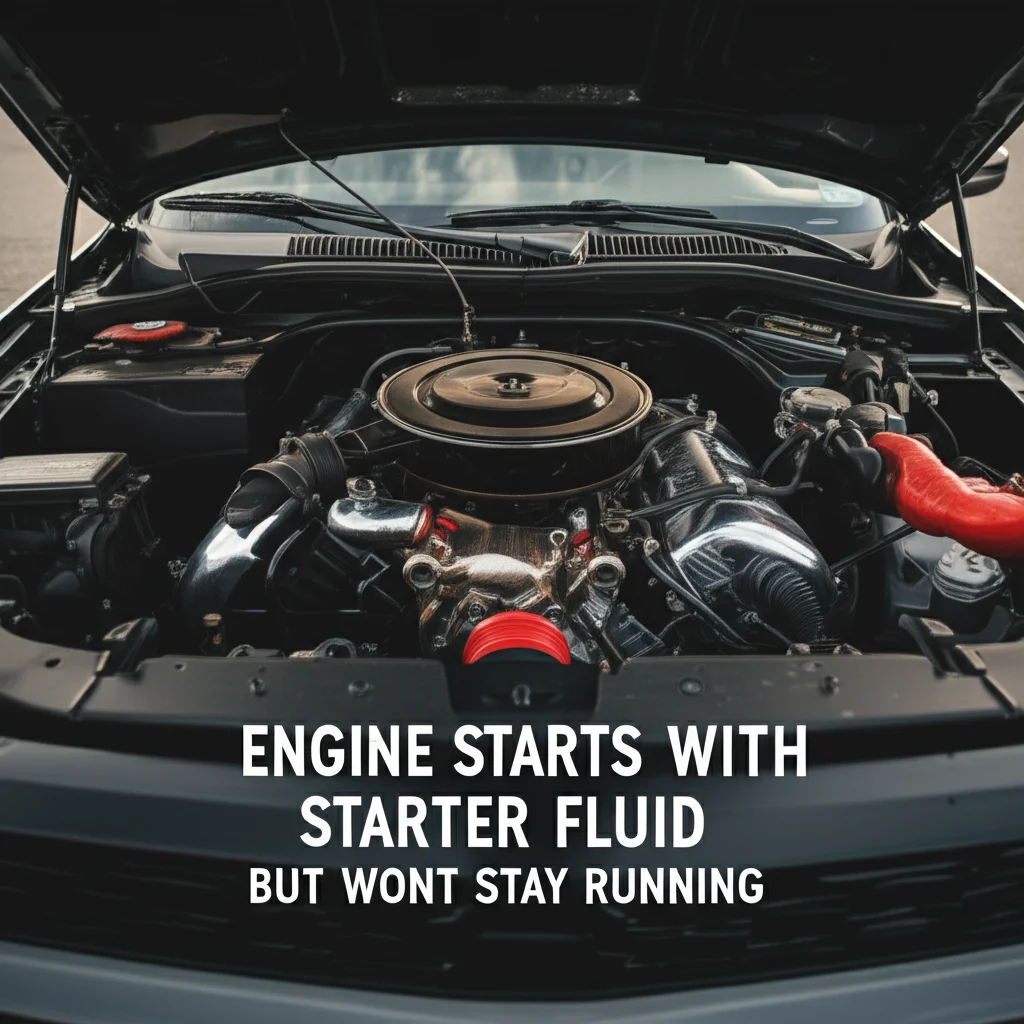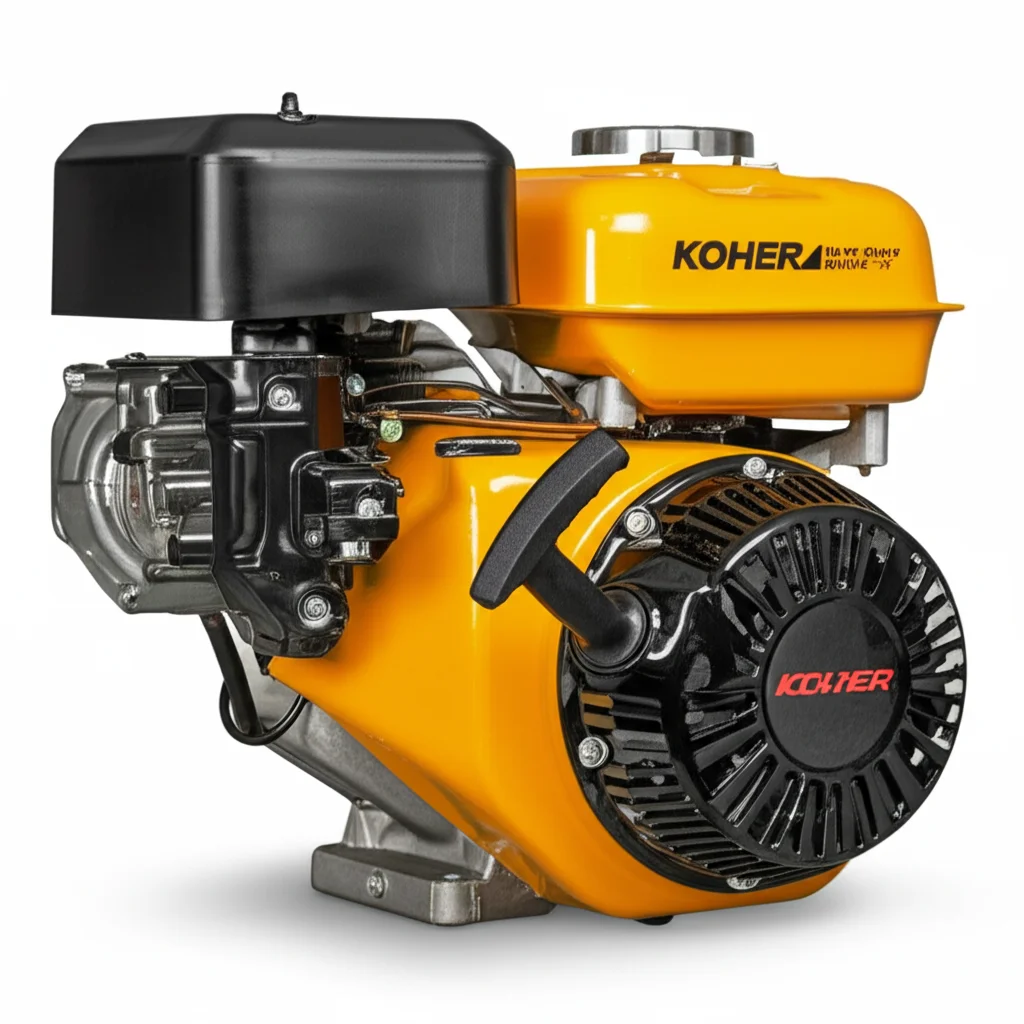· Automotive Repair · 6 min read
Engine Starts With Starter Fluid But Wont Stay Running

Engine Starts With Starter Fluid: What’s Going On?
Have you ever experienced the frustration of an engine that fires up briefly with a spray of starter fluid, only to die immediately? This is a common issue, and thankfully, it usually points to a problem within the fuel system. It means the engine can physically run, but it isn’t receiving fuel. This article will walk you through the most likely causes, how to diagnose them, and what you can do to get your engine running reliably again. We’ll cover everything from simple fixes to more complex troubleshooting steps.
Takeaway:
- The problem is almost always fuel-related.
- Check the fuel pump, fuel filter, and fuel injectors.
- Inspect for fuel leaks and ensure proper fuel pressure.
- Consider a clogged fuel line or a faulty fuel pressure regulator.
Quick Answer: If your engine starts with starter fluid but won’t stay running, it almost always indicates a problem with the fuel delivery system. The starter fluid bypasses the normal fuel system, allowing a temporary start, but without fuel, the engine quickly stalls.
1. Understanding Why Starter Fluid Works (Temporarily)
Starter fluid is a highly flammable spray containing ether. It’s designed to ignite easily, even in cold conditions, providing a quick burst of combustion. When you spray it into the engine’s intake, it creates a temporary, self-contained explosion that gets the engine turning. However, this is a temporary fix. The engine relies on a consistent supply of fuel to continue running, and starter fluid doesn’t provide that. Think of it as a jumpstart for the combustion process, not a replacement for gasoline or diesel. Using starter fluid excessively can also damage engine components, so it’s crucial to identify and fix the underlying fuel delivery issue.
2. Fuel Pump Failure: A Common Culprit
The fuel pump is responsible for delivering fuel from the gas tank to the engine. If the fuel pump fails, the engine won’t receive any fuel, leading to the starter fluid scenario. You might not hear the fuel pump prime when you turn the ignition key (a whirring sound from the rear of the vehicle). Testing the fuel pump is relatively straightforward. You can check for voltage at the pump’s connector and also measure fuel pressure at the fuel rail. A lack of pressure confirms a faulty fuel pump. If you suspect a fuel pump issue, it’s best to have it professionally diagnosed and replaced. You can learn more about cleaning other engine components at https://beacleaner.com/how-to-clean-engine-oil-off-concrete.
3. Clogged Fuel Filter: Restricting Fuel Flow
A clogged fuel filter restricts the flow of fuel to the engine. Over time, dirt, rust, and debris can accumulate in the fuel filter, hindering fuel delivery. This is a common issue, especially in older vehicles or those that haven’t had regular maintenance. Symptoms of a clogged fuel filter include difficulty starting, reduced engine power, and stalling. Replacing the fuel filter is a relatively inexpensive and easy maintenance task that can often resolve the problem. It’s a good practice to replace the fuel filter as part of your regular maintenance schedule.
4. Fuel Injector Issues: No Spray, No Run
Fuel injectors are responsible for spraying fuel into the engine’s cylinders. If the fuel injectors are clogged or faulty, they won’t deliver the necessary amount of fuel for combustion. You can test fuel injectors using a multimeter to check their resistance. A faulty injector will often show an incorrect resistance reading. Sometimes, fuel injectors can be cleaned, but in many cases, replacement is necessary. A professional mechanic can perform a fuel injector flow test to determine if they are functioning correctly. Keeping your engine clean can help prevent issues like this; consider https://beacleaner.com/how-to-clean-carbon-buildup-in-engine for more information.
5. Blocked Fuel Lines: A Fuel Delivery Obstruction
Fuel lines carry fuel from the tank to the engine. A blockage in a fuel line can prevent fuel from reaching the engine. This blockage could be caused by rust, debris, or a kink in the line. Inspect the fuel lines for any visible damage or kinks. You can also try disconnecting the fuel line at various points to see if fuel flows freely. Be extremely careful when working with fuel lines, as they can be under pressure. If you find a blockage, you may need to replace the affected section of the fuel line.
6. Faulty Fuel Pressure Regulator: Maintaining the Right Pressure
The fuel pressure regulator maintains the correct fuel pressure in the fuel rail. If the fuel pressure regulator is faulty, it can cause either too much or too little fuel pressure. Too little pressure will result in the engine stalling, while too much pressure can cause other engine problems. You can test the fuel pressure regulator using a fuel pressure gauge. The gauge should show a consistent pressure reading within the manufacturer’s specifications. If the pressure is fluctuating or incorrect, the fuel pressure regulator likely needs to be replaced.
7. Checking for Fuel Leaks: Losing Fuel Before It Gets There
Sometimes, the problem isn’t a component failure, but a fuel leak. A leak anywhere in the fuel system – from the tank to the injectors – can reduce fuel pressure and prevent the engine from running. Carefully inspect all fuel lines, connections, and the fuel tank for any signs of leaks. You might smell fuel, or see wet spots. Even a small leak can cause significant fuel loss. Repairing fuel leaks is crucial for both engine performance and safety. If you find a leak, address it immediately.
FAQ: Engine Starts With Starter Fluid
Q: Is it okay to use starter fluid regularly? A: No, using starter fluid regularly is not recommended. It’s a temporary fix and can potentially damage engine components. It masks the underlying problem and doesn’t address the root cause of the engine’s failure to start.
Q: What if I have good fuel pressure but the engine still won’t run? A: If you have good fuel pressure, the issue might be with the fuel injectors, ignition system, or engine timing. Further diagnostics are needed to pinpoint the exact cause.
Q: How often should I replace my fuel filter? A: Most manufacturers recommend replacing the fuel filter every 30,000 miles or two years, whichever comes first. However, this can vary depending on your driving conditions and the quality of the fuel you use.
Q: Can a bad crankshaft position sensor cause this issue? A: Yes, a faulty crankshaft position sensor can prevent the engine from receiving the necessary signals to time fuel injection and ignition, leading to a similar symptom.
Conclusion: Getting Your Engine Running Again
If your engine starts with starter fluid but won’t stay running, the problem almost certainly lies within the fuel system. By systematically checking the fuel pump, fuel filter, fuel injectors, fuel lines, and fuel pressure regulator, you can diagnose the issue and get your engine running smoothly again. Remember to prioritize safety when working with fuel and consult a professional mechanic if you’re unsure about any of the troubleshooting steps. Don’t ignore this issue, as it can lead to further damage if left unaddressed. Regular maintenance, including fuel filter replacement and fuel system inspections, can help prevent these problems from occurring in the first place. For more cleaning and maintenance tips, explore resources like https://www.lawntrend.com/how-to-clean-engine-block.
- fuel system
- engine troubleshooting
- starter fluid
- no fuel
- engine won't run



